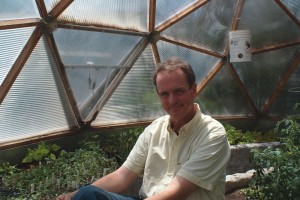Lance Cheslock obviously has the right chemistry for problem-solving — even if it doesn’t involve his chemistry degree.
After graduation, he taught chemistry, physics, and art history at an East Coast prep school and tested the waters of biochemical research, before spending three years in Haiti with one of Habitat for Humanity’s first international projects, working with rural housing and community development. There he found his passion, and the model he learned — putting volunteers on the frontlines with a lot of responsibility — has been his model ever since.
Returning to the U.S. in the summer of 1989, he moved to Alamosa, Colo., where his sister had a spare bedroom, and became director of La Puente, the first established rural homeless shelter in the country. Lance set out to study the needs of the poor, strengthen La Puente’s programming, and build community support for programs aimed at helping those in Colorado’s impoverished San Luis Valley.
The CC magna cum laude chemistry major was a catalyst for change. Over the years, he has led an extraordinary expansion of La Puente’s programs, many of them aimed at intervening and stopping the chain reaction that can lead to homelessness. From its basement beginnings, La Puente now includes programs aimed at homeless prevention, job-readiness training, service learning, transitional living for homeless families, clothing resources, and a children’s after-school and summer program. It also operates a domestic-violence safe house, harvest recovery project, community gardens initiative, a group of low-income apartments, and a network of 13 food banks spread throughout six counties —
an area the size of Massachusetts.
He also has established social enterprises, including two thrift stores, a coffeehouse, a boutique, and a soon-to-be-launched aluminum recycling program, that help fund La Puente’s programs.
“A variety of classes I took at CC contribute to the skills I have now,” helping him navigate the non-scientific course his life has taken, Lance said. “The liberal arts education helped channel the lens of a chemistry major, and prepared me for a different challenge. The very first class I took at CC, John Riker’s Introduction to Ethics, had an enormous influence on me and set the tone from the beginning of my days there,” he said. Sociology classes helped with writing skills and the numerous public presentations he makes. Lance acknowledges that taking business courses would have been helpful, as all successful nonprofits are based on sound financial practices, but that was not on his radar at the time.
Despite the enormous impact La Puente has had on the San Luis Valley and its residents, Lance is equally proud of his organization’s continuous relationship with CC. The first BreakOut group, a student-led, student-organized club that coordinates service trips, arrived at La Puente in 1989, and groups have been coming ever since.
“It’s been an unbroken chain,” Lance said. “Students who are coming now were not even born when the first group arrived.” Also unbroken, he says, has been the CC Chemistry Department’s support for his work, with numerous faculty members contributing regularly to La Puente. Chemistry professor and former advisor Nate Bower nominated Lance for CC’s Livesay Award for Social Change, which Lance accepted this spring.
Colin McCarey ’12, who led three BreakOut trips to La Puente, said, “I felt I was introducing CC students to the best example of an effective nonprofit that I knew, and hoped that in so doing, Lance’s work could inspire another generation of CC students to become socially minded leaders. La Puente is the most comprehensive and community-integrated nonprofit organization that I have ever encountered.”
Lance has been widely recognized for his expertise on rural homelessness, an issue that differs significantly from urban homelessness. “The Department of Housing and Urban Development looks at everything through an urban lens,” he said. “I want to elevate awareness of the rampant numbers of the rural homeless, and have them receive resources that are equitable to those in cities but appropriate to rural communities.”
“Most of us, students included, see the need for services in the ‘inner city’ where most of these shelters and programs are found,” Bower said. “But we miss the even greater need in rural areas and other locations outside the center of big cities. Lance is not only a spokesperson when the state and federal governments are involved, but he also offers internships, advice, and encouragement to most anyone, including students, who are serious about it.”
